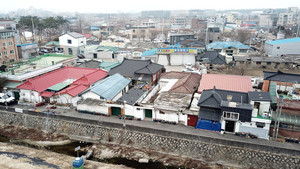
Amid the government’s decision to supply more than 6,000 public rental housing units to 12 local governments across the country for the vulnerable residents such as the residents of Jokbangchon, opposition from building owners in the target site of the Jokbangchon maintenance project is increasing.
According to the Ministry of Land, Infrastructure and Transport on the 14th, the Ministry of Land, Infrastructure and Transport plans to provide priority support for at least 6,000 households in public rental housing to 12 local governments (30 cities, counties, and gus) across the country to improve the housing level of the vulnerable this year. .
The target areas for the metropolitan area project are ▶Gyeonggi Suwon, Bucheon, Hwaseong, Ansan, Siheung, Gwangmyeong, Yangpyeong-gun ▶Incheon Jung-gu, Dong-gu, Gyeyang-gu, Michuhol-gu ▶Seoul Guro-gu, Gwanak-gu, Yongsan-gu, Jung-gu, Dongjak-gu, Gwangjin-gu, Gangnam-gu, Yangcheon-gu, etc. For each project implementing agency, the basic local government is set at a maximum of 80 million won and the metropolitan local government is set at a maximum of 720 million won, resulting in a total project cost of 2 billion won.
The Ministry of Land, Infrastructure and Transport decided to closely support the entire process from relocation counseling to moving-in and settlement of public rental housing in cooperation with the local government in charge of the project and the Korea Land and Housing Corporation (LH) for the smooth migration of the vulnerable.
However, the housing improvement support project has suffered from the beginning as the rearrangement project of Jikbang Village, which is promoted to provide a place to live for the residents of Jikbang Village, and to improve the poor environment where Jikbang Village and Gosiwon are concentrated, faced opposition from land and home owners.
Earlier, the government announced on the 5th that it would develop a public housing complex in Yongsan Dongja-dong, the largest suburban village in Seoul, formed near Seoul Station, into a public housing complex with a height of up to 40 stories and supply a total of 2,410 households. It expressed a strong sense of opposition by publishing a press release condemning the development plan.
An official from the Huam Special Plan Zone 1 (Dongja) Preparation Promotion Committee said, “The government has not made any consultations or opinions with the land and building owners, so the plan was announced by surprise without any prior consent.” · It is absolutely unacceptable to completely exclude the building owner from deciding on development behavior,” he said.
On the homepage of the Ministry of Land, Infrastructure and Transport, a related press release was attached to the website of the Ministry of Land, Infrastructure and Transport, saying, “Do not steal private property on the grounds of the residents of Jeokbangchon” and “I invested in Dongja with the money that I have shed blood and sweat for 20 years as a double-income, but the country is trying to take it out of the way.” Dozens of comments were posted.
Professor Kwon Dae-jung of the Department of Real Estate at Myongji University said, “The building owner is in a position to be compelled to buy land by giving up rental income and receiving cash payment as an appraisal amount according to the Land Compensation Act. To minimize it, there is no only way to increase the compensation amount.”
Reporter Park Da-ye
